2000 Toyota 4Runner Tires & Services
Get Started
Complete Auto Care for Your 2000 Toyota 4Runner
-
TIRES FOR YOUR 2000 Toyota 4Runner View Tire Info GET TIRE PRICING
-
REPAIR FOR YOUR 2000 Toyota 4Runner View Repair Info SCHEDULE REPAIR
-
MAINTENANCE FOR YOUR 2000 Toyota 4Runner View Maintenance Info SCHEDULE MAINTENANCE
-
OFFERS FOR YOUR 2000 Toyota 4Runner Limited Time Tire Offers VIEW ALL COUPONS
2000 Toyota 4Runner Tires
Recommended Tires | Tire Information
2000 Toyota 4Runner Tires Sizes, Speed Ratings, and Inflation
Not sure about your 2000 Toyota 4Runner tire size? Use the following chart to find information on tire size, speed rating, and inflation.
| Trim Level | Speed Rating | Inflation in PSI F/R | Tire Size |
|---|---|---|---|
| 2000 Toyota 4Runner SR5* | S | 29 PSI/29 PSI | P225/75R15 |
| 2000 Toyota 4Runner SR5* | S | 32 PSI/32 PSI | P265/70R16 |
| 2000 Toyota 4Runner Limited | S | 32 PSI/32 PSI | P265/70R16 |
| 2000 Toyota 4Runner Base* | S | 29 PSI/29 PSI | P225/75R15 |
| 2000 Toyota 4Runner Base* | S | 32 PSI/32 PSI | P265/70R16 |
|
2000 Toyota 4Runner SR5* Speed Rating: S Inflation F/R: 29 PSI/29 PSI |
|
2000 Toyota 4Runner SR5* Speed Rating: S Inflation F/R: 32 PSI/32 PSI |
|
2000 Toyota 4Runner Limited Speed Rating: S Inflation F/R: 32 PSI/32 PSI |
|
2000 Toyota 4Runner Base* Speed Rating: S Inflation F/R: 29 PSI/29 PSI |
|
2000 Toyota 4Runner Base* Speed Rating: S Inflation F/R: 32 PSI/32 PSI |
* Note: these models have different tire sizes depending on vehicle options.
Recommended Tires for Your 2000 Toyota 4Runner
What tires are best for a 2000 Toyota 4Runner? Check out the following tire brands and types.
 ALENZA AS ULTRA
ALENZA AS ULTRA
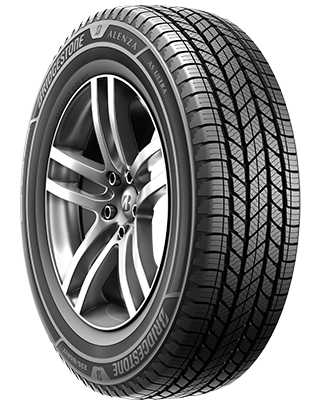
- No warranty
- All-Season
- Light Truck Tires
 Blizzak DM-V2
Blizzak DM-V2
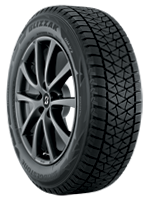
- No warranty
- Winter
- Winter
 Dueler A/T Revo 3
Dueler A/T Revo 3
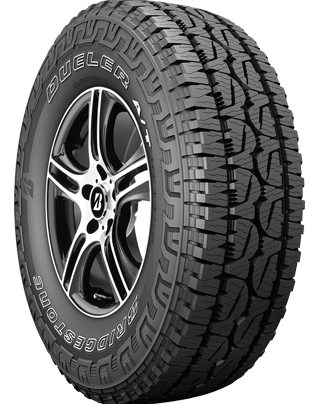
- Platinum Pact Limited Warranty
- All-Season
- Light Truck Tires
 Destination LE3
Destination LE3
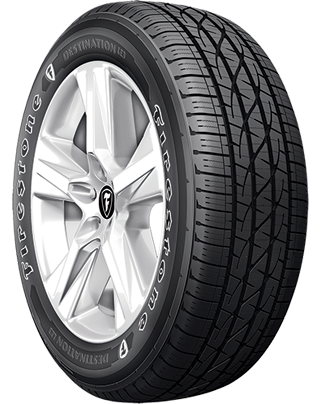
- No warranty
- All-Season
- Light Truck Tires
 Destination A/T2
Destination A/T2
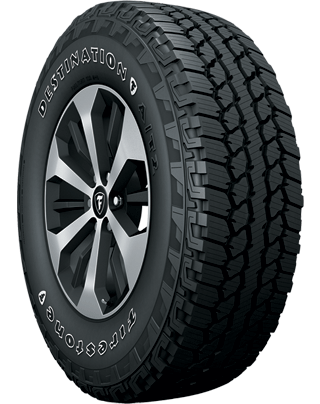
- Gold Pledge Limited Warranty
- All-Season
- Light Truck Tires
 Winterforce 2 UV
Winterforce 2 UV
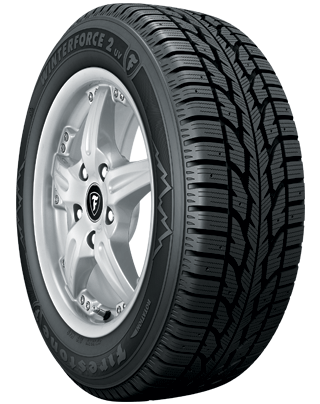
- No warranty
- Winter
- Winter

- No warranty
- All-Season
- Passenger Tires
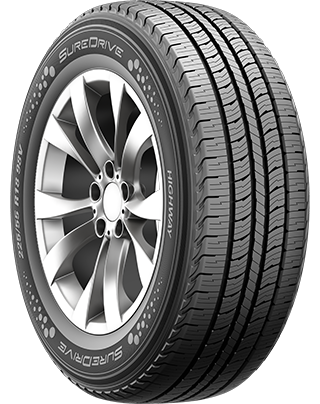
- No warranty
- All-Season
- Light Truck Tires
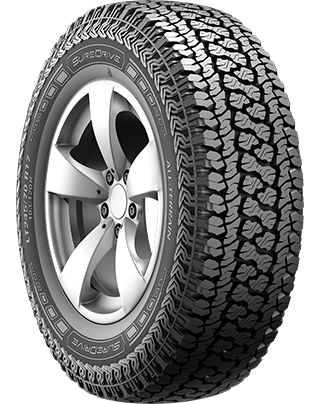
- No warranty
- All-Season
- Light Truck Tires
 Extensa A/S II
Extensa A/S II

- No warranty
- All-Season
- Passenger Tires
 OPEN COUNTRY A/T III
OPEN COUNTRY A/T III
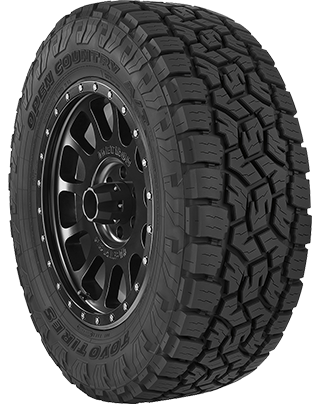
- No warranty
- All-Season
- Light Truck Tires
2000 Toyota 4Runner Tire Information
Other than getting the proper tire size, you also want to think about a couple of other things when getting new Toyota 4Runner tires like where and how you drive, and what tire brand you trust most. When evaluating your driving conditions, think about where you live (countryside vs. city vs. mountains) and the kind of unexpected weather you're likely to experience. Drivers in states that fully experience all four seasons often buy two sets of tires: one for summer and one for winter. Other drivers prefer to purchase one all-season set to limit trips to the tire shop and make sure their vehicle is prepared in the rain, sleet, snow, or sun!
Driving style is next on the list to think about when buying tires. If you're a diehard off-roader, you have very different tire needs than a highway commuter who doesn't leave the paved path. Talk to a tire technician at Firestone Complete Auto Care for help choosing the best tire for you, or start shopping for Toyota 4Runner tires online.
2000 Toyota 4Runner Tire Installation & Rotation
We sell tires, but we also service them and care for all the around-the-wheel components. We're your one-stop shop for tire installation, rotation, and ongoing maintenance! We make it easy to buy new 2000 Toyota 4Runner tires online and book an installation appointment at the same time.
2000 Toyota 4Runner Tire Questions
-
Is Toyota tire inflation important? A small decrease in tire pressure can have a big impact on your driving. Maintaining proper tire pressure can help improve braking time, increase fuel economy, and boost tire lifespan.
-
Why are there numbers on the side of my Toyota 4Runner tires? Your tire sidewall numbers tell you the recommended load carrying capacity, speed rating, treadwear, traction, and tire size. Talk to a tire technician to learn how to read Toyota tire numbers.
-
Can I check the tread depth on my Toyota tires at home? Stay on top of your tire tread depth to help avoid a dangerous drive. You can check tread depth with a penny. Hold the penny so that Abraham Lincoln is facing you, then place your penny into a tread groove upside down. If you can see the top of Abe’s head, your tread is shallow and it might be time for new Toyota 4Runner tires. Grab a penny. Hold the so that Abe Lincon's head is facing you and his hair is pointing toward the ground. Then, place the penny into a tread groove. If you can see the top of Abe’s head, your tread is shallow and it might be time for new Toyota 4Runner tires.
Repair Services for Your 2000 Toyota 4Runner
When to repair, when to replace? Click on a repair below to learn more about Toyota 4Runner repairs at Firestone Complete Auto Care.
2000 Toyota 4Runner Repair Information
For most drivers, the words “car repair” don’t exactly spark excitement. But we work to provide you with a different experience at Firestone Complete Auto Care. When you come to us for 2000 Toyota 4Runner repair services, rest easy knowing that your 4Runner is in capable hands. We’ll start by assessing what repairs may be needed, and we’ll provide you with a detailed explanation of what we recommend. We value your trust, so we recommend only the repairs we think are necessary for your safety on the road.
What Will Toyota 4Runner Repairs Cost?
Several factors can affect the cost to repair your 2000 Toyota 4Runner, including what kind of repair you need, the cost of any replacement parts, the amount of labor necessary to get the job done, and the state you live in. We update them regularly to keep our deals fresh!
A few different aspects can influence repair costs for your 2000 Toyota 4Runner, like
2000 Toyota 4Runner Auto Repair Questions
-
Do I need to follow Toyota's maintenance schedule? Don’t neglect scheduled maintenance. Sure, you could skip out on a few recommended maintenance services, but you may pay the price later. Bring your vehicle to Firestone Complete Auto Care at recommended service intervals to address minor issues before they get out of hand and keep your car running newer, longer.
-
What's wrong if something feels 'off' in my Toyota? You’re in your car, day in and day out. So, it’s only expected that you know your car better than anyone else! If you notice mysterious smells, strange engine noises, or other out-of-the-ordinary symptoms while driving, trust your instincts and stop into Firestone Complete Auto Care for a Courtesy Check. Catching a potential issue early could help prevent Toyota 4Runner repairs.
-
Why do you recommend certain repairs for my Toyota? We won’t recommend a service or repair for your 2000 Toyota 4Runner unless we think it’s necessary to keep you safe. Want to know more about a specific recommended repair? Ask! We’re here to help.
2000 Toyota 4Runner Brake Repair
Your Toyota 4Runner may be powered by a strong engine. But if you can’t stop it, it’s as good as scrap metal. If you notice your brakes are squeaking or not working well, don’t wait! Safe driving and responsive brakes go hand in hand. Plus, ignoring your brake problems can result in more damage and higher brake repair bills. Visit Firestone Complete Auto Care for the right brake repair for your 2000 Toyota 4Runner. We offer many affordable brake repairs like brake pad/shoe removal and replacement, brake rotor/drum machining, brake fluid exchange, and brake caliper and wheel cylinder service.
Toyota 4Runner Brakes Frequently Asked Questions
-
What is causing my 4Runner to shake when I brake? Your 4Runner could shake when you brake due to worn brake pads or rotors, warped rotors, loose or worn suspension components, or faulty brake calipers. You can always schedule a free brake inspection at the first sign of strange brake behavior.
-
What is the average lifespan of 4Runner brake pads? Brake pads generally last between 30,000 and 40,000 miles. Your driving can affect how long your 4Runner brake pads last, though. For example, mainly driving on highways and gradually braking can help increase the lifespan of your brake pads, and carrying hefty loads or riding your brakes can shorten it.
-
Does brake fluid leak when the car is off? Your 4Runner has a closed hydraulic brake system, meaning you should not have a brake fluid leak under normal conditions. However, parts of your brake system can wear out over time or become damaged, which can lead to a brake fluid leak.
When to Get Toyota 4Runner Drivetrain Repairs
You don't want to go to just anyone for drivetrain repair. Drivetrains for front, rear, and all-wheel-drive and 4WD vehicles are all different. You want to go to Firestone Complete Auto Care. We can fix many 2000 Toyota 4Runner drivetrain components Your Toyota could be crying out for driveshaft repair if you notice vibration as your vehicle accelerates, clunks when shifting, heavy vibrations in your floorboards, or resistance when turning.
2000 Toyota 4Runner Drivetrain Q&A
-
How do I know if my Toyota drivetrain is damaged? Your Toyota 4Runner drivetrain might be damaged if you notice strange noises from the rear of your vehicle, see fluid leaking, or have issues turning.
-
Why is my 4Runner malfunction indicator light (MIL) on? The malfunction indicator light — also known as the check engine light — on your 4Runner can illuminate for a variety of reasons, including engine issues, electrical problems, damaged sensors, transmission problems, misfires, and faulty connections.
-
Is a drivetrain malfunction in my 4Runner serious? Don't ignore a drivetrain malfunction in your 4Runner. As soon as you notice a problem, have it checked by a professional mechanic to diagnose the issue and carry out any necessary repairs. Driving with a faulty drivetrain is risky and may further damage your 4Runner.
2000 Toyota 4Runner Wheel Alignment
An alignment involves making adjustments to your Toyota 4Runner's suspension system, the connection between the vehicle and the wheels. During the service, calculated changes are made to the angles of your tires. This is so that your tires hit the road at an optimal angle for your vehicle’s performance — just as Toyota intended. Bring your 2000 Toyota 4Runner in for a wheel alignment and we'll start with an alignment check. If needed, we'll adjust your wheel alignment angles to match Toyota recommendations.
Questions About Toyota 4Runner Alignment
-
Are there road conditions that can hurt my Toyota 4Runner alignment? Potholes and uneven roads can knock your car out of alignment, so stay aware of the road ahead and adjust your speed (or avoid these obstacles whenever it’s safely possible).
-
How frequently should you get a wheel alignment for your 4Runner? It’s usually suggested you check your alignment about every 6,000 miles or 6 months (whichever occurs first). Still, you should reference your 4Runner owner’s manual for Toyota's recommended interval.
-
Do you need to get your 4Runner wheels aligned when you get new tires? You likely aren't required to get an alignment when you put new tires on your 4Runner, but it's a super smart idea! An alignment can help ensure optimal tire wear, fuel efficiency, and handling. Still, you should reference your 4Runner owner’s manual for what’s recommended.
2000 Toyota 4Runner Engine Services
If your 2000 Toyota 4Runner needs engine repair, our technicians will provide you with a thorough explanation beforehand. We make recommendations, but you make the final decision. If a repair can wait, we'll let you know. We'll also tell you if it's necessary for your safety. We want to provide you with the information you need to make an informed engine repair decision. By choosing Firestone Complete Auto Care for 4Runner engine repairs and you can drive easy knowing that we use Toyota-approved parts and fluids — timing belt, oil gasket, sensors, or a different component.
Questions About 2000 Toyota 4Runner Engines
-
Why does the check engine light in my 4Runner turn on when I start my car? It's okay if your check engine light comes on when you first start your vehicle. This is a sign that your vehicle is testing its circuits. The light should go off shortly. Bring your vehicle in if it doesn't.
-
Why is my Toyota 4Runner making engine noise? Strange under-the-hood noises can point to problems within your Toyota 4Runner engine. Tapping or knocking could mean you need an oil change. Whistling sounds could mean you have an intake leak or misaligned belt. Squealing may be caused by a loose fan belt, and grinding could be a sign that something is wrong with your brakes — not the engine.
-
What could damage my Toyota 4Runner engine? Certain driving habits can hurt your engine. These habits include driving on an empty fuel tank, revving your engine while the vehicle is in Park, or slamming the gas pedal while the engine is still cold. Steer clear of these habits to help protect engine performance and efficiency.
Tire Repair for Your 2000 Toyota 4Runner
Firestone Complete Auto Care is here for you when your 2000 Toyota 4Runner needs flat tire repair or inspection. Our tire technicians can determine whether it's safe to plug and patch the tire, or whether it needs to be replaced. We'll start by evaluating the state of wear, the location of damage, type of damage, and the size of the damage.
If your 2000 Toyota 4Runner tire puncture can be repaired, we’ll get to work on the steps to fix it: (1) Separate the tire from the vehicle wheel, (2) fill the puncture to keep the moisture out, and (3) seal the inner liner with a repair unit to prevent air loss.
Toyota 4Runner Tire Repair Questions
-
What happens if I drive my Toyota on a flat tire? A flat tire that’s not addressed can take a terrible toll on the rest of your car. Until you have it repaired or replaced, drive your 4Runner as little as possible to reduce your risk of damage to the wheels and alignment – or further damage to that already struggling tire!
-
Will a temporary sealant fix my Toyota's flat tire? Temporary sealants will solve your problem… for a little bit. If you’ve seen temporary or emergency tire sealant before (it usually comes in a can), it can be tempting to turn to this as a solution for your flat tire. Keep in mind that these fixes could buy you some time to get to Firestone Complete Auto Care for a proper repair, but they could also cause some harm in the process (for example, damage to your TPMS). Plus, using a product like this could void your tire warranty.
-
Why do my 4Runner tires keep losing air? Your 4Runner tires might keep losing air due to a leaking valve stem, puncture or hole in the tire tread or sidewall, or damaged wheel.
Maintenance for Your 2000 Toyota 4Runner
When it comes to your Toyota 4Runner, how you treat your car makes all the difference in its performance. With proactive maintenance, your 4Runner could be on the road well past the 200,000 mile mark.
2000 Toyota 4Runner Maintenance Information
Instead of waiting for an issue to arise with your 4Runner, you can stay ahead of problems before they even begin. Just follow your 2000 Toyota 4Runner maintenance schedule! Toyota knows your vehicle inside and out (they made it, after all!), so they’ve designed this schedule with your car’s unique needs in mind. Driving conditions, climate variations, and other variables can affect which scheduled maintenance services you’ll need; however, recommended maintenance usually includes services like fluid exchanges, filter changes, new brake pads, oil changes, and tire rotations. Staying on track with routine service appointments can help your 4Runner perform better, decrease your risk of dangerous malfunctions on the road, and prevent common 2000 Toyota 4Runner problems.
Essential Maintenance to Keep Your 2000 Toyota 4Runner Running Newer, Longer
Come to Firestone Complete Auto Care for manufacturer-recommended routine maintenance on your 2000 Toyota 4Runner and a skilled technician will start the appointment with a Courtesy Check. The Courtesy Check helps us see what we’re working with under the hood, and allows us to alert you to any potential problems before they worsen. Each Courtesy Check includes a free battery test and an inspection of your 4Runner's windshield wiper blades, head and tail lights, filters, fluid levels, tires, and alignment.
Firestone Complete Auto Care is the place to go for 2000 Toyota 4Runner maintenance. So visit us regularly, or visit us urgently. Many locations are open on weekends and in the evening.
2000 Toyota 4Runner Maintenance Q&A
-
What do I do if I hit a pothole in my Toyota 4Runner? You know your Toyota 4Runner better than anyone else, so you’ll know if something doesn’t feel right while driving. Have your alignment checked (and adjusted if necessary) as soon as you notice a pulling steering wheel to prevent suspension damage or uneven tire wear.
-
When should I use high mileage oil in my Toyota 4Runner? If your Toyota 4Runner has ticked past 75,000 miles, consider switching to high mileage oil at your next oil change to give your engine what it needs to go another 75,000 (or more!). High mileage oil: make it a high priority!
-
Why are my Toyota dashboard lights on? Because there might be a problem under the hood. Those warning lights are there for a reason! As soon as you notice that one’s illuminated, take your Toyota 4Runner to Firestone Complete Auto Care so you can address any small problems long before they worsen.
2000 Toyota 4Runner Battery Replacement & Size
Need more info about Toyota 4Runner batteries?
| Battery | Engine | Warranty | Cold Cranking Amps | |
|---|---|---|---|---|
| 24F-3 | L4/2.7L | Replacement 24 months | Performance months | 650 |
| 24F-6 | L4/2.7L | Replacement 36 months | Performance months | 750 |
| 24F-RP | L4/2.7L | Replacement 48 months | Performance months | 750 |
| 35-1 | V6/3.4L | Replacement 24 months | Performance months | 500 |
| 24F-6 | V6/3.4L | Replacement 36 months | Performance months | 750 |
| 24F-RP | V6/3.4L | Replacement 48 months | Performance months | 750 |
2000 Toyota 4Runner Car Batteries
On average, auto batteries last anywhere from three to five years. You want to replace your 2000 Toyota 4Runner battery before it fails and leaves you stranded. Pay attention to clues that your battery is on its way out. A sluggish engine start, a blinking battery or check engine light, bloated battery case, corroded battery posts, or weak lights can all be signs that your battery is waving goodbye.
Plus, at Firestone Complete Auto Care, we’ll test your battery for free. Visit us for a complimentary battery check and, if needed, get your Toyota 4Runner a replacement battery. Automotive batteries are just one of our many areas of expertise. Our technicians are familiar with Toyota-specific recommendations for 4Runner car batteries’ reserve capacities and cold cranking amps. Get help choosing the battery size that matches your vehicle, and schedule a fast car battery replacement at your earliest convenience.
Top Toyota 4RunnerCar Battery Questions
-
Why won’t my Toyota 4Runner battery hold a charge? A car battery that needs to be jump-started every time is as good as dead. It may be getting old. Or, you’ve been leaving the doors slightly open and the dome lights on during the night. Stop in for a free battery check at your nearest Firestone Complete Auto Care and learn more about your battery's charge.
-
How long can I expect my car battery to last? A car battery normally lasts three to five years, but this number can vary based on battery type, your driving habits, and battery maintenance.
-
Why is there white, flaky stuff around my 4Runner’s battery post? A chemical reaction between battery acid and the air can cause a white, crusty buildup to form on the terminals of your 4Runner car battery. This buildup — known as corrosion — can impede the flow of electricity and cause a range of issues, from poor performance to premature battery failure.
Oil Changes for 2000 Toyota 4Runner
Toyota recommends having your 2000 Toyota 4Runner’s motor oil changed at regular intervals. Outside of Toyota-recommended oil change intervals, your 4Runner may need an oil change if your check engine light is on, you hear knocking sounds coming from the engine, smell oil inside the car, or notice an unusual amount of exhaust. You may also need an oil change more frequently than Toyota recommends if you haul heavy loads, drive in dusty terrain, go off-roading a lot, or drive at low speeds for long distances.
Whether it’s synthetic, conventional, or a blend of both — your local Firestone Complete Auto Care has the right oil for your Toyota 4Runner. Consult Toyota's recommendations to select the right 2000 4Runner oil and talk with a teammate to learn more about our oil options: Quaker State® Advanced Durability™ conventional oil, Pennzoil® High Mileage Vehicle® motor oil, Pennzoil Platinum® Full Synthetic motor oil with PurePlus™ Technology, and Shell Rotella® heavy-duty engine oil. In an oil change service, one of our techs will change your 4Runner’s oil, replace and recycle your used oil and oil filter, inspect the rest of your car’s filters, top-off essential fluids, and visually inspect the rest of the vehicle. Get professional engine care by making an oil change appointment for your 4Runner today.
Oil Change Q&A for Your 2000 Toyota 4Runner
-
What can cause the oil light on my Toyota 4Runner to illuminate? Your Toyota 4Runner oil change reminder light might illuminate if it’s been too long since your last oil change. On the other hand, the oil pressure light might illuminate due to a clogged oil filter, a faulty oil pressure sensor, low engine oil levels, or a malfunctioning oil pump.
-
How hard is it to change Toyota 4Runner oil at home? First off, changing your own oil isn’t as easy as you’d think. You’ll have to buy special tools and figure out a way to recycle the old oil properly. Getting a professional oil change reduces the risk of something going wrong during the service, but also helps your car perform down the road.
-
Why is my Toyota 4Runner spewing blue or gray exhaust smoke? Your engine could be burning oil due to a leak. It may be time for a pro to take a look. A leak can be caused by a variety of issues including faulty valve seals, blown piston rings, or damaged cylinder walls.
2000 Toyota 4Runner Engine Tune-Ups & Maintenance
Periodic tune-ups can bring more power back to your 4Runner’s engine. Your local Firestone Complete Auto Care offers a range of engine tune-up services for your 2000 Toyota 4Runner. The first is the standard Firestone Tune-Up. The standard Firestone Tune-Up includes new spark plugs (and installation!), a thorough inspection of engine components, and a lifetime parts warranty*. Another service option pays special attention to the filters in your 4Runner. Specifically, we replace the fuel filter and air filter. Our third service is a thorough cleaning of the fuel system. During this type of tune-up, we use a three-step process to get rid of harmful varnish, dirt, and carbon deposit buildup in your 4Runner’s fuel injectors, throttle body, and throttle plate. The result? Restored fuel system performance. Consider this when choosing a tune-up service for your 4Runner: your vehicle’s maintenance record and mileage can determine which service is best. Chat with a Firestone technician before you jump into a specific service to ensure your engine tune-up money is well-spent.
*Talk to a Firestone Complete Auto Care teammate for full terms and conditions on warranties.
Questions About 2000 Toyota 4Runner Engine Tune-Ups
-
What happens if my Toyota 4Runner spark plugs fail? Replace spark plugs on time or about every 30,000 miles or so. Without the spark of electricity created by spark plugs, your engine doesn’t have the combustion it needs to start — which could leave you stranded on the road. Always replace your spark plugs on time based on Toyota’s recommendations.
-
What does a puddle underneath my Toyota 4Runner mean? Puddles could indicate an oil leak, coolant leak, or brake fluid leak– all of which can critically hurt your engine. Have your engine inspected as soon as you spot a pool of liquid in your usual parking spot.
-
How often should I clean my Toyota 4Runner fuel injectors? The frequency at which car fuel injectors should be cleaned can vary depending on several factors, including the type of fuel used and the driving conditions. Some manufacturers generally recommend a fuel system cleaning as part of your general car maintenance, or as needed based on symptoms of poor fuel system performance.
Suspension Service & Repair for 2000 Toyota 4Runner
During the first few years you had your 2000 Toyota 4Runner, you probably enjoyed a smooth and steady ride. Lately, though, your ride’s been feeling a little bumpy. Maybe your 4Runner jolts, leans to one side, or makes an unusual noise when going over a speed bump. The first sign of problems is a good time to bring your 2000 Toyota 4Runner in for steering and suspension services. We’ll get to the source of your car problems and, if your 4Runner suspension system needs repair, we'll explain all of your options and the potential cost.
2000 4Runner Steering & Suspension Q&A
-
Why is my Toyota 4Runner bouncing so much? If it feels like you’re on a trampoline every time your 4Runner goes over a bump or dip, you may have a problem with your struts or shocks. Faulty shocks and struts can’t properly absorb road bumps, leading to a bouncy ride.
-
What can cause the front end of my 4Runner to dip forward when I apply the brakes? As you brake, the forward momentum of your 4Runner combined with its weight sends a ton of force to its front end. A damaged or worn suspension system can cause the front end to compress and dip even further.
-
Does treadwear and tire pressure impact my 4Runner's steering and suspension? Maintaining your tires can help reduce strain on the suspension, nd also let you know when it's time to replace your tires. A faltering steering and suspension system could lead to uneven tire wear.
Convenient & Local 2000 Toyota 4Runner A/C Service
Our trained technicians will do what they can to solve your 2000 Toyota 4Runner A/C problems. In this A/C performance inspection, we’ll check out the current condition of your 2000 Toyota 4Runner A/C system to determine whether repair work is needed. This check includes a visual inspection, performance test, and pressure and leak test.
When we perform an A/C repair on your 2000 Toyota 4Runner, we’ll also do an A/C evacuation and recharge. During this process, a technician will remove the old refrigerant from the A/C system. Then, they’ll use Toyota’s specifications to evacuate the system. The A/C system is recharged with new refrigerant.
Questions About 2000 Toyota 4Runner A/C Systems
-
What’s making my 4Runner A/C put out warm air? If your car’s air conditioning isn’t blowing cold air at all (or it tries, then turns warm), you could have a clogged expansion valve, a faulty compressor clutch, a leak, or a malfunctioning fuse in the system.
-
What can cause an A/C system leak? A/C system leaks are often due to a combination of age and moisture. Rubber seals and gaskets naturally degrade over time, allowing refrigerant to exit and moisture to enter your 4Runner's A/C system.
-
Why does my 4Runner’s A/C only work when the car is moving? Damaged or worn components in your 4Runner’s electrical or air conditioning system can cause the A/C to only work when the car is moving. You may be dealing with low coolant or a faulty cooling fan.
Transmission Services for 2000 Toyota 4Runner
Your transmission carries power from the engine to the wheels so that you can drive at the speed you desire. Because your transmission is responsible for converting the right amount of power into the right amount of speed, a small transmission issue can put a big dent in your 4Runner’s performance. 2000 Toyota 4Runner transmission problems can show up as shifting delays, jumping or grinding during acceleration, the car shaking on the road, or whistling noises or a burning smell coming from beneath the hood. If you don’t pay attention to Toyota 4Runner transmission trouble you could see your fuel economy decrease or discover that your 4Runner’s not even driveable. Our expert techs are familiar with 2000 4Runner services and perform them according to Toyota-recommended specifications. Schedule an appointment at your local Firestone Complete Auto Care at the first sign of transmission problems to help keep your engine running at peak performance.
Questions About 2000 Toyota 4Runner’s Transmission
-
When should I have my 4Runner's transmission fluid checked or exchanged? Maintaining your Toyota 4Runner transmission fluid is one of the best ways to maintain your transmission's health. A general rule of thumb is to have your transmission fluid checked and changed about every 30,000 to 60,000 miles, but that timeline can change if you're hard on your Toyota. Leaks or low transmission fluid are easy to spot and affordable to repair.
-
Is it possible for transmission fluid to leak from my Toyota 4Runner? Yes, your Toyota 4Runner can develop a transmission fluid leak. As your 4Runner ages, parts of the transmission system might wear out or break down, leading to a leak and possible transmission issues. Common causes of transmission fluid leaks include worn seals, a damaged transmission housing, a loose or cracked transmission pan, an overfilled transmission, or faulty transmission lines.
-
Should I avoid driving my Toyota 4Runner if there is a transmission fluid leak? You should avoid driving with a transmission fluid leak. Your transmission system relies on transmission fluid to operate properly, and a leak may decrease performance, cause your 4Runner to overheat, or even lead to transmission failure.
Vehicle Inspection for 2000 Toyota 4Runner
Every service performed at Firestone Complete Auto Care includes a multi-point Courtesy Check. The technician will begin by testing your Toyota 4Runner's battery to see how much charge it has left – and determine if it may fail in the near future. We’ll follow the battery inspection with a visual check of your Toyota 4Runner’s filters, lights, wiper blades, hoses, alignment, tires, fluid levels, and belts.
We perform a Courtesy Check any time you bring your car to a local Firestone Complete Auto Care for service, but we also offer an in-depth Complete Vehicle Inspection for your 2000 Toyota 4Runner. During a Complete Vehicle Inspection, we’ll visually check everything that’s on the list for a Courtesy Check. Additionally, we’ll perform an examination (by hand!) of your exhaust system, steering and suspension, and brakes. This inspection is aimed at informing you of any major problems that could wreak havoc on your 2000 Toyota 4Runner if left unaddressed.
Depending on where you live, your local Firestone Complete Auto Care may be able to perform state-mandated inspections or safety tests on your vehicle. These inspections are governed by state automotive laws and may vary in different locations.
2000 Toyota 4Runner Vehicle Inspection Q and A
-
When does my Toyota 4Runner need an inspection? If you’ve noticed something that doesn’t feel quite right in your car lately, a Courtesy Check could give you peace of mind. We can help you get to the bottom of strange engine noises, a jerky steering wheel, or an engine that's hard to start.
-
My 2000 Toyota 4Runner failed the state inspection test. Can you fix it? Don’t panic! Come in for a complete inspection today and we’ll find (and repair) the root cause before you have your vehicle retested.
-
What's the ideal timing for a full vehicle inspection on my Toyota 4Runner? The best time to get a complete vehicle inspection for your Toyota 4Runner is before going on a road trip for the peace of mind. Another great time is when something abnormal occurs, and you can't pinpoint the issue. You might notice new dashboard lights, hear strange noises from under the hood, or your steering wheel doesn't feel like it once did.
2000 Toyota 4Runner Radiator Service
Regular, proactive service on the radiator in your 2000 Toyota 4Runner is a huge factor in the longevity of your engine. Toyota recommends that you replace coolant (also called antifreeze) at certain intervals, but it’s a good idea to keep your eyes open for any indication that your radiator is failing. You could be on the verge of a radiator-induced engine breakdown if you notice a low coolant light or higher-than-normal engine temperatures on your dashboard, or if you spot coolant leaks coming from your car.
At Firestone Complete Auto Care, we start by performing a thorough inspection of your Toyota 4Runner cooling system. We then do a machine-powered radiator exchange, replenish flushed chemicals, sealants, and lubricants, and then pressure check for leaks. From the radiator cap to the heater core, we’re here to give your 2000 Toyota 4Runner the top-notch service it needs.
2000 Toyota 4Runner Radiator Q&A
-
What does the coolant light on my Toyota dashboard mean? Your engine might be about to overheat. If your low coolant light is on, pull over in a safe area and wait for your engine temperature to go down. Once it’s safe to do so, bring your car to your nearest Firestone Complete Auto Care to have the coolant system inspected.
-
Why is my 4Runner overheating? Low coolant, a damaged cooling fan, a faulty water pump, a malfunctioning thermostat, or a clogged radiator could all cause your Toyota 4Runner engine to overheat.
-
My 4Runner radiator sounds like it's rumbling or boiling! What's up? Air pockets in your 4Runner’s cooling system may cause a rumbling or boiling noise. You could also have a clogged radiator or simply need to replace the radiator cap.